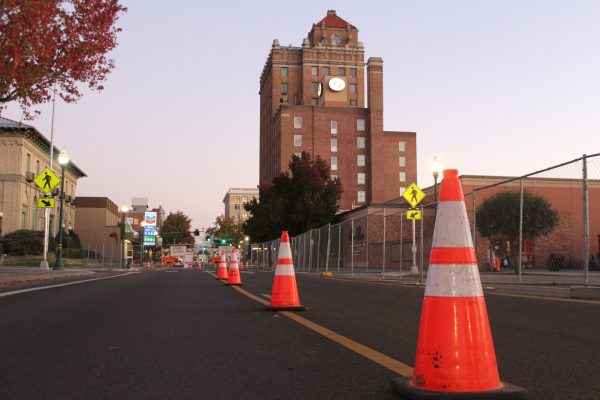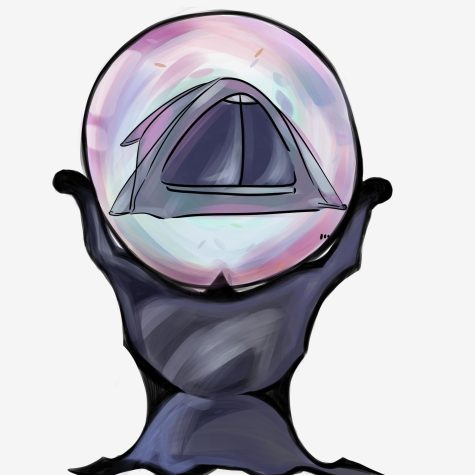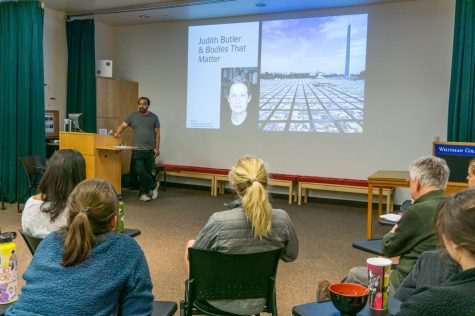Philosophy Department Prepares to Host Heidegger Circle
October 27, 2016
Whitman will play host this spring to the fifty-first annual meeting of the Heidegger Circle, a nationwide group of philosophy scholars with an interest in the work of early nineteenth century philosopher Martin Heidegger. Organized by philosophy professor and prominent Heidegger scholar Julia Ireland, the conference will involve speeches and papers by prominent Heidegger scholars from around the globe.
The conference is scheduled for March 30-April 2 of next year, and will take place largely at the Marcus Whitman Hotel at the corner of Rose Street and Third Avenue North. It is entitled “Art, Landscape, Technology,” a title which Ireland says is derived from some lesser-known portions of Heidegger’s work.
“In (Heidegger’s most famous work) Being and Time, Heidegger was interested in resurrecting the question ‘what is the meaning of being?’ But he’s one of those thinkers who is constantly reinventing what philosophy is about,” Ireland said. “He’s very deeply engaged in readings of poetry. The landscape part is conceptions of nature—that nature is not something that’s abstract, it’s always situated according to place, in a home, or even in a homeland. And then … the concern with technology—he was prescient in the critique of technology, and I think he’s read that way,” Ireland said.
The conference is preceded by a series of events organized by Philosophy students Nolan Bishop, a junior, Gillian Gray and Jack Lassiter, both seniors. These events, Ireland says, are intended to help bridge the gap between the visiting scholars and Heidegger enthusiasts and the campus at large.
“Because Whitman is not a university with a philosophy graduate program, it was really important to me to try to integrate it with stuff that is part of the Whitman curriculum,” Ireland said of the conference. “In bringing the conference here, it was really important to me to take the theme of the conference and to try and say ‘Can I build some campus programming to kind of prepare and expose students to things that they might encounter at the conference, at a much higher level?’”
At each, the students and Ireland work to recruit professors across the disciplines to discuss Heidegger’s relationship with those disciplines. Bishop coordinated one such event at the German house on October 20, featuring Ireland and Environmental Humanities and German professor Emily Jones. Gray is scheduling another one for late November entitled “Art, Sculpture, Space,” which Bishop says could correspond with Encounters students’ examination of “Carnival,” the multicolored statue that stands between Boyer Avenue and Douglas Hall. That pairing is still in the works, he said.
“The schedule of events is still a little flexible right now,” Bishop said. “I think we haven’t pinned down exactly when everything’s going to happen, but we’re trying to draw in as much of the school as we can across the various disciplines.”
Ireland also hopes to make the conference a hotspot for philosophy-related networking. Twelve Whitman alumni with PhDs in philosophy have been invited back to campus for the proceedings, and with anywhere between 50 and 65 philosophy scholars convening in Walla Walla, students interested in the discipline. Gray, Bishop, and Lassiter in particular will have plenty of opportunities to hear about the places philosophy could take them.
“From the perspective of someone who’s helping to run the event logistically, it will be such a great experience to talk with professors from all over the country,” Gray said. “It’ll be a great opportunity to talk with people who I wouldn’t normally have access to speak with, especially since I’m going into grad school.”
This article was updated on March 30, 2017 to reflect the correct dates of the conference.










Gary E. Davis • Oct 28, 2016 at 11:27 am
Heidegger was a thinker of the 20th century, not “the early 19th century.” He sought to prepare academic conditions for an epochal new beginning for philosophy, but he was not “constantly reinventing what philosophy is about.” He pursued a singular Project to cultivate thinking—authentic, timely, and primordially open—for the sake of new beginning for and by “those to come.”
Gary E. Davis
Berkeley
https://www.facebook.com/Heidegger
Pete Ferreira • Oct 27, 2016 at 3:13 pm
> early nineteenth century philosopher Martin Heidegger
early 20th century